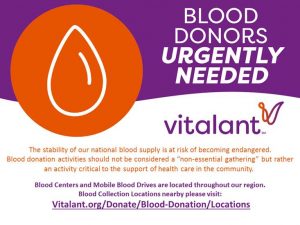BY ZARA AFRIDI, INTERN & BRANDY TUZON BOYD
THE NATOMAS BUZZ | @natomasbuzz
 The community blood supply is in urgent need of donations.
The community blood supply is in urgent need of donations.
“Many blood drives in our region have been canceled or postponed due to business closures and school closures which are having a great impact on blood collections,” Vitalant spokesperson Heather Sharp said.
In Natomas, blood drives are frequently held at the Regal movie theater and Club at Natomas Park, but these and other blood drive events in the greater Sacramento area have been canceled or postponed due to the COVID-19 crisis. As a result, the coronavirus is impacting the area’s blood supply.
“Currently, we are in the process of working with organizations that we have partnered with specifically in the Natomas area,” Sharp said. “But as the situation remains fluid, the best thing to do is direct donors to our website for the most current information on blood drives and collection sites.”
Natomas resident Tristan Mason has been donating blood for more than 25 years.
“Make a positive impact in someone else’s life by donating blood,” Mason said. “You never know if you yourself may need a blood donation one day.”
Doreen Lopez, another Natomas resident, donated blood for several years until she was diagnosed with breast cancer.
“Think about all the people who need a blood transfusion,” Lopez said. “Wouldn’t you just want to take some time out of your day to help them? Helping to save lives makes a greater impact on others and yourself.”
The federal Food and Drug Administration is urging blood donations during the COVID-19 crisis. All Vitalant Blood Collection Centers remain open and are accepting appointments.
“If you are healthy, it is imperative that you keep your appointment or plans to give blood,” Sharp said. “If you are not feeling well, please do not donate; Vitalant does NOT test for COVID-19.”
Sharp added that donating blood is safe.
“The coronavirus does not pose any known risk to blood donors during the donation process,” she said.
Here’s what Vitalant is doing to protect donors:
- Only healthy people are encouraged to come give blood. Donors must be feeling well and free of respiratory illness symptoms, including fever, to be eligible to donate.
- People who meet certain travel and other at-risk criteria for coronavirus infection are deferred ahead of time from donating..
Vitalant staff wear gloves and personal protective gear; they wipe down donor-touched areas often and after every collection using a disinfectant. - Staff use sterile, single-use collection sets for each donor and scrub the donor’s arm for 30 seconds before the collection.
Staff who don’t feel well are required to stay home.
Why Give Blood?
Blood is needed every single day in America. One in seven people who go to the hospital need blood and an average of 4.5 million Americans would die each year without life saving blood transfusions, according to Vitalant’s website.
However, only 37% of the population is eligible to donate blood and less than 10% donate. One pint of blood can save up to three lives, since it has plasma, red cells, and platelets.
The process of the blood donation takes about an hour. Before donating, it is recommended to eat a nutritious meal to improve blood flow and make donating easier.
Donating starts with a questionnaire for volunteers to check their eligibility. A photo ID will also be required.
Before the draw, there is also a mini-physical check which consists of checking your pulse, blood pressure, temperature, and iron level (done by pricking a finger).
The next step is the blood draw which is about 10 to 15 minutes in total. One pint of blood will be drawn.
Donors are provided snacks and fluids to stabilize their blood sugar levels and are encouraged to remain in the refreshments area for at least 15 minutes after their blood is drawn.


Speak Your Mind
You must be logged in to post a comment.